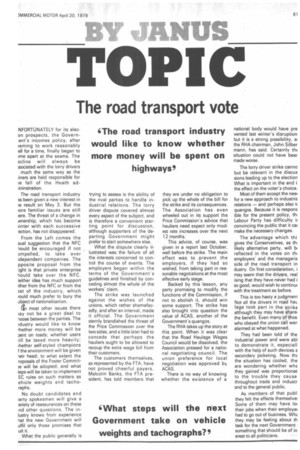TOIP I C
Page 63

If you've noticed an error in this article please click here to report it so we can fix it.
The road transport vote
The road transport industry would like to know whether more money will be spent on highways,
NFORTUNATELY for its elecon prospects, the Governient's incomes policy, after ;eming to work reasonably ell for a time, finally began to wne apart at the seams. The ecline will always be ;sociated with the lorry drivers much the same way as the liners are held responsible for le fall of the Heath adiininstration.
The road transport industry as been given a new interest in le result on May 3. But the lore familiar issues are still lere. The threat of a change in Nnership, which has become ;inter with each successive ection, has not disappeared.
From the Left comes the sual suggestion that the NFC hould be encouraged if not Dmpelled, to take over Idependent companies. The pposite proposal from the ight is that private enterprise hould take over the NEC. leither idea has much support ither from the NFC or from the 3St of the industry, which muld much prefer to bury the ubject of nationalisation.
most other issues there lay not be a great deal to noose between the parties. The Idustry would like to know rhether more money will be pent on roads; whether users /ill be taxed more heavily; thether self-styled champions f the environment will be given leir head; to what extent the roposals of the Foster Commit= ;e will be adopted; and what teps will be taken to implement EC rules on such matters as ehicle weights and tachoraphs.
No doubt candidates and larty spokesmen will give a ariety of reassurances on these Ind other questions. The inlustry knows from experience hat the new Government will ulfil only those promises that uit What the public generally is trying to assess is the ability of the rival parties to handle industrial relations. The lorry driver dispute covered almost every aspect of the subject, and is therefore a convenient starting point for discussion, although supporters of the departing Government might prefer to start somewhere else.
What the dispute clearly illustrated was the failure of all the interests concerned to control the course of events. The employers began within the terms of the Government's guidelines and finished by conceding almost the whole of the workers' claim.
The strike was launched against the wishes of the unions, which rather shamefacedly, and after an interval, made it official. The Government sternly brandished the threat of the Price Commission over the two sides, and a little later had to concede that perhaps the hauliers ought to be allowed to recoup the extra wage bill from their customers, The customers themselves, as represented by the FTA, have not proved cheerful payers. Malcolm Banks, the FTA president, has told members that they are under no obligation to pick up the whole of the bill for the strike and its consequences. The Association has even wheeled out in its support the Price Commission's advice that hauliers need expect only modest rate increases over the next 12 months.
This advice, of course, was given in a report last October, well before the strike. The main effect was to prevent the employers, if they had so wished, from taking part in reasonable negotiations at the most effective early stage.
Backed by this lesson, any party promising to modify the functions of the Commission, if not to abolish it, should win some support. The strike has also brought into question the value of ACAS, another of the Government's quangos.
The RHA takes up the story at this point. When it was clear that the Road Haulage Wages Council would be dissolved, the Association pressed for a national negotiating council. The union preference for local negotiation was approved by ACAS.
There is no way of knowing whether the existence of a national body would have pre vented last winter's disruption but it is a strong possibility, a the RHA chairman, John Silber mann, has said. Certainly th( situation could not have beer made worse.
The lorry driver strike canna but be relevant in the discus sions leading up to the election What is important in the end i the effect on the voter's choice.
Most of them accept the nee( for a new approach to industria relations — and perhaps also t, quangos. Because it is respon5 ible for the present policy, th, Labour Party has difficulty ii convincing the public that it cai make the necessary changes.
The advantage which thi gives the Conservatives, as tft likely alternative party, will la reflected in the votes on th, employers' and the manageria side of the road transport in dustry. On first consideration, i may seem that the drivers, real ising that they have never had i so good, would wish to continui with the treatment as before.
This is too hasty a judgmeni Not all the drivers in road haL lage took part in the strike although they may have share, the benefit. Even many of thos who obeyed the union call wer alarmed at what happened.
They had been told of the industrial power and were abl to demonstrate it, especiall with the help of such devices a secondary picketing. Now thE the situation has cooled, the are wondering whether whE they gained was proportionat to the trouble they cause throughout trade and industr and to the general public.
As members of that publ they felt the effects themselve: Some of them may have lo! their jobs when their employe' had to go out of business. Whi' they may be feeling about th task for the next Government something that should be of in erest to all politicians.












































































































